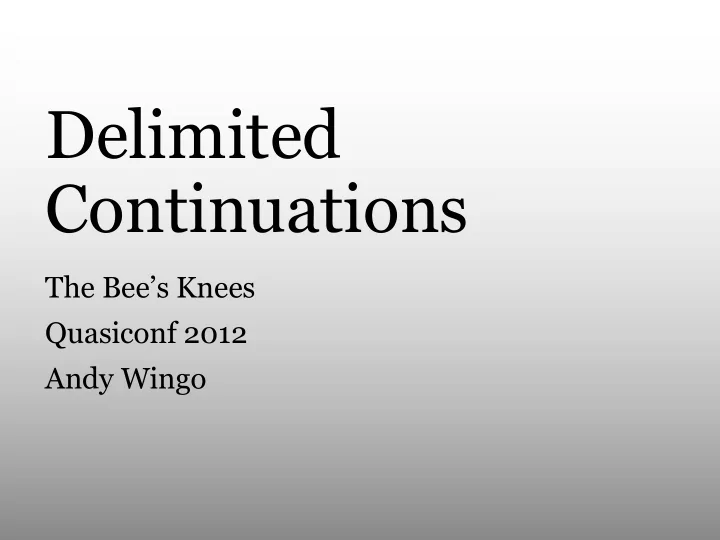

Delimited Continuations The Bee’s Knees Quasiconf 2012 Andy Wingo
A poll How many of you use call/cc and continuation objects in large programs? Do “we” really use it to implement coroutines and backtracking and threads and whatever? Is call/cc necessary for Scheme?
Heresy Those questions originally raised by racketeer Matthias Felleisen in 2000 Thesis of this presentation: call/cc bad, delimited continuations good
Against call/cc (1) Requires set! to do almost anything with multiple returns Passing arguments to continuations: manual CPS
Against call/cc (2) “A global goto with arguments” Captured continuations do not compose with current continuation: (call/cc (lambda (k) (k (k 1)))) Oleg: “Call/cc is a bad abstraction.”
Against call/cc (3) Delimited in practice... ...but where? Almost always too much
Scheme deserves better Delimited continuations Sitaram 1993: “Handling Control” http://www.ccs.neu.edu/scheme/pubs/ pldi93-sitaram.pdf Felleisen 1988: “The theory and practice of first- -class prompts” http://www.cs.tufts.edu/~nr/cs257/ archive/matthias-felleisen/prompts.pdf
Bibliography, ctd Flatt et al 2007: “Adding Delimited and Composable Control to a Production Programming Environment.” http://www.cs.utah.edu/plt/publications/ icfp07-fyff.pdf Dybvig, Peyton-Jones, and Sabry 2007: “A monadic framework for delimited continuations” http://www.cs.indiana.edu/~dyb/pubs/ monadicDC.pdf
Example. (use-modules (ice-9 control)) (% (+ 1 (abort)) ; body (lambda (k) k)) ; handler % pronounced "prompt" What is captured: (+ 1 []) Wrapped in a function: (lambda vals (+ 1 (apply values vals)))
Compositional A function, not a global goto (let ((k (% (+ 1 (abort)) (lambda (k) k)))) (k (k 1))) = ((lambda vals (+ 1 (apply vals vals))) ((lambda vals (+ 1 (apply vals vals))) 1)) = (+ 1 (+ 1 1)) = 3
Analogy with shell fork/exec : coredump :: % : abort Differences ❧ “Cores” from delimited continuations aren’t dead ❧ More expressive value passing ❧ Nestable ❧ The language, not the system
Tags (% tag body handler ) (define-syntax-rule (let/ec k exp) (let ((tag (make-prompt-tag))) (% tag (let ((k (lambda args (apply abort-to-prompt tag args)))) exp) (lambda (k . vals) (apply values vals)))))
Optimizations Escape-only prompts ❧ Handler like (lambda ( k v ...) ...) , k unreferenced ❧ Implementable with setjmp/longjmp, no heap allocation
Optimizations Prompt elision ❧ (% (make-prompt-tag) exp h) = exp ❧ Result of inlining (let/ec k body ) , k unreferenced in body ❧ Provide break , no cost if unused
Optimizations Local CPS Fundamentally dynamic: hence “dynamic control”
Mental model Aborting to escape-only prompt: longjmp Aborting to general prompt ❧ Copy of stack between prompt and abort ❧ Copy of dynamic bindings in same Calling delimited continuation: splat stack, augment dynamic environment
Other names “Composable continuations” “Partial continuations”
Other formalisms % / abort % / control call-with-prompt / abort-to-prompt reset / shift set / cupto All equivalent
Limitations Calling a delimited continuation composes two continuations: one stays in place, the other is pushed on No way to use copying of C stack to do this: C stack frames are not relocatable No standard way to capture continuation without unwinding to prompt
But what do I do with it? A prompt is a boundary between programs Prompts best conceived as concurrency primitives The REPL and your code run concurrently
Node with automatic CPS Delimited continuations: the ideal building block for lightweight threads Set file descriptors to non-blocking If EWOULDBLOCK , abort Scheduler installs prompt, runs processes
(ice-9 nio) nio-read
(ice-9 eports) fdes->eport file-port->eport accept-eport connect-eport get-u8 , etc
(ice-9 ethreads) run spawn , suspend , resume , sleep
memcached-server.scm (1) (define (socket-loop esocket store) (let loop () (let ((client (accept-eport esocket))) (spawn (lambda () (client-loop client store))) (loop))))
memcached-server.scm (2) (define (client-loop eport store) (let loop () (let* ((args (string-split (read-line eport) #\space)) (verb (string->symbol (car args))) (proc (hashq-ref *commands* verb))) (unless proc (client-error eport "Bad: ~a" verb)) (proc eport store (cdr args))) (drain-output eport) (if (eof-object? (lookahead-u8 eport)) (close-eport eport) (loop))))
questions? ❧ Guile: http://gnu.org/s/guile/ ❧ Prompts: http://www.gnu.org/software/ guile/manual/html_node/Prompts.html ❧ Ethreads branch: wip-ethreads in Guile ❧ Words: http://wingolog.org/ ❧ Slides: http://wingolog.org/pub/qc-2012- delimited-continuations-slides.pdf ❧ Notes: http://wingolog.org/pub/qc-2012- delimited-continuations-notes.pdf
Recommend
More recommend